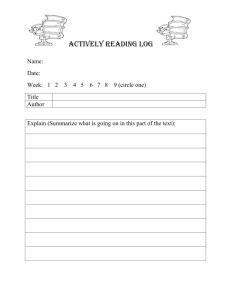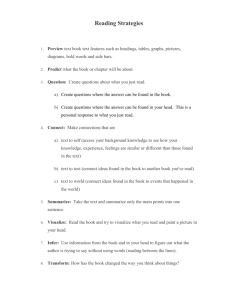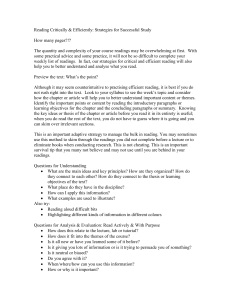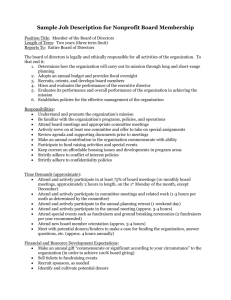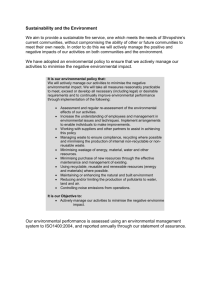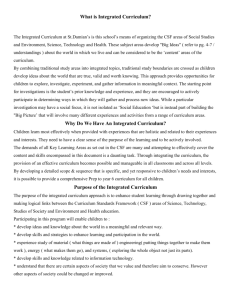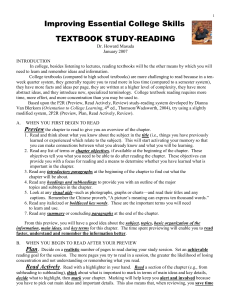Principles of Memory
advertisement
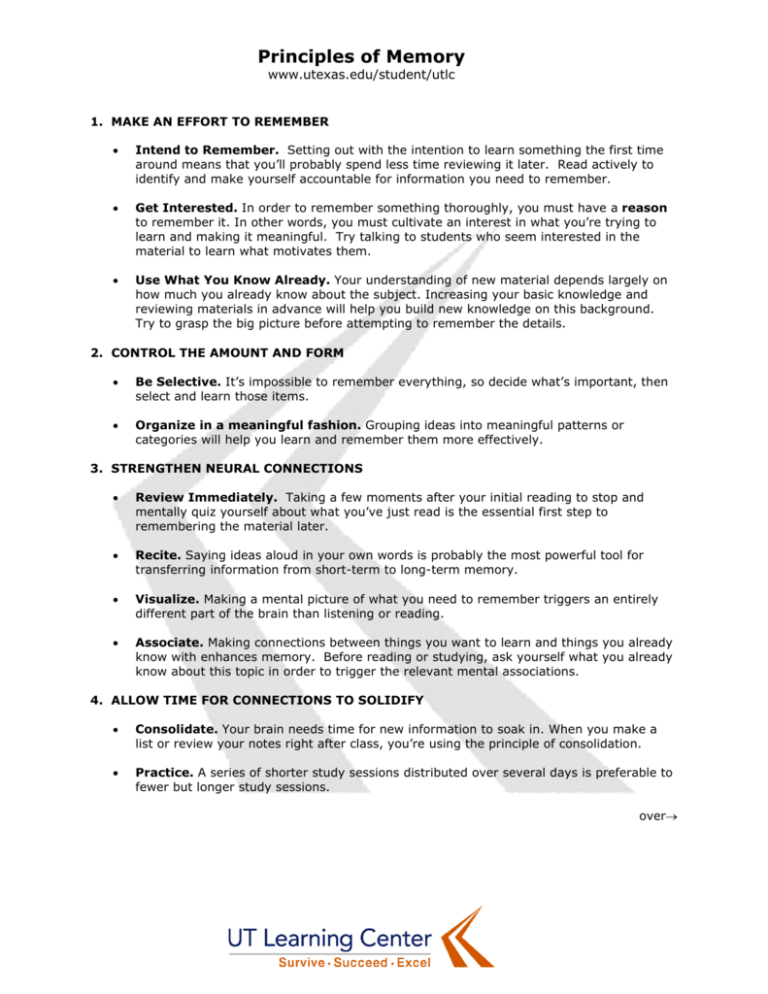
Principles of Memory www.utexas.edu/student/utlc 1. MAKE AN EFFORT TO REMEMBER • Intend to Remember. Setting out with the intention to learn something the first time around means that you’ll probably spend less time reviewing it later. Read actively to identify and make yourself accountable for information you need to remember. • Get Interested. In order to remember something thoroughly, you must have a reason to remember it. In other words, you must cultivate an interest in what you’re trying to learn and making it meaningful. Try talking to students who seem interested in the material to learn what motivates them. • Use What You Know Already. Your understanding of new material depends largely on how much you already know about the subject. Increasing your basic knowledge and reviewing materials in advance will help you build new knowledge on this background. Try to grasp the big picture before attempting to remember the details. 2. CONTROL THE AMOUNT AND FORM • Be Selective. It’s impossible to remember everything, so decide what’s important, then select and learn those items. • Organize in a meaningful fashion. Grouping ideas into meaningful patterns or categories will help you learn and remember them more effectively. 3. STRENGTHEN NEURAL CONNECTIONS • Review Immediately. Taking a few moments after your initial reading to stop and mentally quiz yourself about what you’ve just read is the essential first step to remembering the material later. • Recite. Saying ideas aloud in your own words is probably the most powerful tool for transferring information from short-term to long-term memory. • Visualize. Making a mental picture of what you need to remember triggers an entirely different part of the brain than listening or reading. • Associate. Making connections between things you want to learn and things you already know with enhances memory. Before reading or studying, ask yourself what you already know about this topic in order to trigger the relevant mental associations. 4. ALLOW TIME FOR CONNECTIONS TO SOLIDIFY • Consolidate. Your brain needs time for new information to soak in. When you make a list or review your notes right after class, you’re using the principle of consolidation. • Practice. A series of shorter study sessions distributed over several days is preferable to fewer but longer study sessions. over→ Principles of Memory www.utexas.edu/student/utlc WHAT? WHEN? intend to remember / learn before beginning study preview the task whenever you begin a new learning project review immediately after learning learn actively spend an hour or two at the end of each study session always when you’re trying to read a whole chapter use short periods of time (2 to 10 minutes) when you have a simple mechanical task or rotememorization tasks practice what you’ve learned between the time you first learn something and the time you’re tested on it learn in an organized way set and understand the goals or objectives for your study always at the beginning of any learning or retrieving sessions WHY? Intention is crucial. If you don't actively plan to remember something, you won't remember it very well. Getting a preview of the whole task will help you later as you read, practice, etc. You'll be able to fill in details of each part if you start with a simplified version of the whole task. Most forgetting takes place immediately after learning occurs—not two hours or two days later. So review immediately, even if it’s just for a few minutes. For example, try to review your notes as soon after class as possible. Use short periods of time (10-15 minutes) to quickly review notes. Spend most of your learning time on selftesting and practice. Expose as many senses as possible to the material: read it, hear it, visualize it, etc. Avoid the common attitude, "Well, I'll just look over this stuff now, and I'll really learn it later." Complex learning, such as understanding new relationships or solving problems, requires longer periods of time for effective learning. But don't study too long—most people can actively learn for about 45 minutes. Then take a 10-minute break. Break up large reading assignments into smaller parts; spread out the task. Simple tasks and anything you have to memorize are best learned in short, frequent practice sessions rather than in longer sessions of an hour or two. Most forgetting takes place because people haven't periodically practiced or reviewed what they learned. Try to do some review before beginning each new assignment. You'll remember much more easily when you have a systematic, orderly view of what you’ve learned. If you’ve studied concepts as isolated events without drawing connections, then you'll forget more quickly. Having a complete overview of each study session will help you become a more systematic and organized learner. This process goes right back to Step One!
